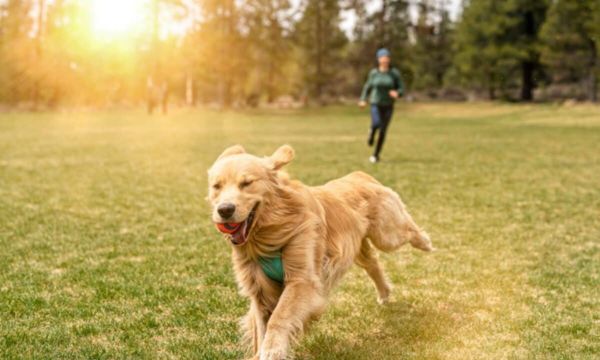Dog Behavior and Nutrition: Vital Connection
The connection between a dog’s behavior and what he eats is an important part of canine health that is often overlooked. As with humans, a dog’s diet and general nutritional health can affect its behavior. Understanding the important connection between a dog’s behavior and what he eats can help pet owners make decisions that positively impact their dog’s behavior, mood and overall quality of life. In this detailed guide, we discuss how a dog’s diet plays an important role in shaping its behavior and provide tips on how to change its diet for optimal behavioral results.
The Gut-Brain Connection in Dogs:
Unveiling the Gut-Brain Axis
Thanks to new research, the gut-brain axis, or what scientists call the way the gut and brain talk to each other, has become clearer. This link shows how the gut microbiome affects many different areas of health, including behavior and well-being. The gut microbiome is made up of trillions of microorganisms that live in the digestive system. These microbes are important for digestion, the immune system and even mental health.
The Impact on Behavior
New research suggests that the composition of a dog’s gut bacteria can influence their behavior and personality. Neurotransmitters such as serotonin are often referred to as “feel good” hormones and are produced in part by a healthy gut. Serotonin is important for controlling mood, anxiety levels, and overall emotional balance. If a dog’s gut microbiome is out of balance, it can cause fear, aggression and even sadness in the dog.
Nutrients Important for Mental Health:
Proteins: Key to Behavior
Protein is an important part of dogs because it is used to make tissues, enzymes, hormones and neurotransmitters. Meals rich in high-quality protein are important for your dog’s mental health and for the proper functioning of your brain. Getting enough protein is especially important for busy dogs or dogs in training.
Omega-3 Fatty Acids: What the Brain Needs
Omega-3 fatty acids, especially EPA (eicosapentaenoic acid) and DHA (docosahexaenoic acid), are known to help the brain. Fatty fish such as salmon and linseed oil are good sources of these fatty acids. Omega-3 helps the brain to develop and work better. They also have anti-inflammatory properties that can help dogs cope with stress and tension.
B Vitamins: Mood Regulators
B vitamins, such as B6, B9 (folic acid), and B12, are important for mood and behavior regulation. These vitamins are needed to make serotonin and dopamine, two neurotransmitters that affect mood, pleasure and drive. Not getting enough B vitamins can affect your mood and behavior.
Minerals: Calm and Balanced
Minerals such as magnesium and zinc are important for nerve activity and the proper balance of neurotransmitters. Magnesium, in particular, can help calm the nervous system and relieve stress and anxiety. Zinc helps your brain work properly and improves your overall mental health.
Customising the Diet to Improve Behaviour:
Protein Quality and Quantity
It is important to choose high quality protein dog food. Look for whole proteins such as chicken, turkey, beef and fish. Avoid foods that contain a lot of fillers and fake ingredients as they may make the diet less healthy.
Add Omega-3 Fatty Acids to Food
Omega-3 fatty acids can be added to your dog’s diet through oily fish, fish oil supplements or vegetable sources such as flaxseed oil. Discuss the appropriate dosage with your vet based on your dog’s size and special needs.
Right Amount of Vitamins and Minerals
Choose dog food that contains all the vitamins and minerals your dog needs for overall health. If you’re considering giving your dog a supplement, check with your vet to make sure you’re meeting his or her unique needs.
Dealing with Food Allergies
Behavioral problems can be caused by food allergies or sensitivities. If your dog is uncomfortable, has stomach problems or behaves differently after eating, you can talk to your vet about hypoallergenic meals or meals with a limited number of ingredients.
Behavioral Changes and Dietary Adjustments:
Observation is Key
As a good pet owner, you should pay attention to any changes in your dog’s behavior. If your mood changes quickly, if you feel more anxious, or if you behave in a way that is out of character, you may want to take a look at your food.
Changes that Take Place Slowly
It’s important to change your foods slowly to avoid upset your stomach. Add new foods or vitamins slowly over a few days to give your dog’s digestive system time to adjust to the new food or vitamins.
Seek Professional Help
If your dog’s behavior changes don’t go away or get worse, see a veterinary or veterinary behaviorist. They can help identify potential food causes and develop a complete plan to address behavior problems.
Case Study: Healthy Food and Healthy Lifestyle
Luna is a three-year-old labrador who shows signs of anxiety and restlessness. Luna’s owner, Emily, decided to investigate whether Luna’s diet was exacerbating these problems.
Emily’s Method
Emily spoke to her veterinary, who recommended that Luna be given an omega-3 fatty acid supplement. She also turned to high-quality dog food with good protein sources and a good balance of nutrients.
Emily noticed that Luna’s behavior improved within a few weeks. Her worries seemed to disappear and she looked calmer and happier. As Luna’s diet changed and she continued positive reinforcement training, her behavior got much better, showing just how much nutrition affects a dog’s behavior.
Conclusion:
The strong link between dog behavior and diet shows how important it is to consider your dog’s diet when trying to improve your dog’s overall health. A balanced diet that contains all the necessary nutrients, such as protein, omega-3 fatty acids, B vitamins and minerals, can help your dog stay calm, balanced and emotionally healthy. As dog parents, we have the power to improve our dog’s behavior and quality of life by making informed decisions and always meeting our dog’s nutritional needs.
FAQs:
1. Can dog behavior problems be solved completely by diet alone?
Nutrition can make an important contribution to solving behavioral problems, but may not be the only solution. Behavioral problems often have complex roots and an integrated approach is recommended, including training, enrichment and possibly professional help.
2. Do Certain Foods Cause Aggression in Dogs?
Some foods can exacerbate behavior problems, but it’s important to understand that aggression is a multifaceted problem with many possible causes. If your dog is behaving aggressively, consult a veterinarian or behaviorist to determine the appropriate course of action.
3. Can I make my own dog food to treat behavioral issues?
Homemade diets can help, but require careful planning to ensure all essential nutrients are provided. Consult a veterinary nutritionist to develop a balanced, homemade diet based on your dog’s needs.
4. Is it possible to over supplement a dog’s diet?
Yes, too much supplementation can cause imbalances and potential health problems. Before adding any supplements to your dog’s diet, it is essential to consult a veterinarian and follow recommended dosing guidelines.
5. Could behavioral changes be a sign of a health problem?
Yes, behavioral changes can sometimes indicate an underlying health problem. If your dog’s behavior changes suddenly or dramatically, consult a veterinarian to rule out any medical issues.
Be sure to check out our article: The Role of Exercise in Dog Behavior. You’ll be surprised at how it will help you clarify doubts on the subject.
 Stop Destructive Chewing: Solutions
Stop Destructive Chewing: Solutions
Chewing is a natural behavior for dogs. It keeps them aware of their surroundings, keeps their teeth […]
More Enrichment Activities for Behavior Improvement
Enrichment Activities for Behavior Improvement
Owning a pet is a rewarding experience, but it’s also your job to meet your furry friend’s […]
More The Role of Exercise in Dog Behavior
The Role of Exercise in Dog Behavior
Exercise is important not only for your dog’s physical health, but also for his or her behavior, […]
More